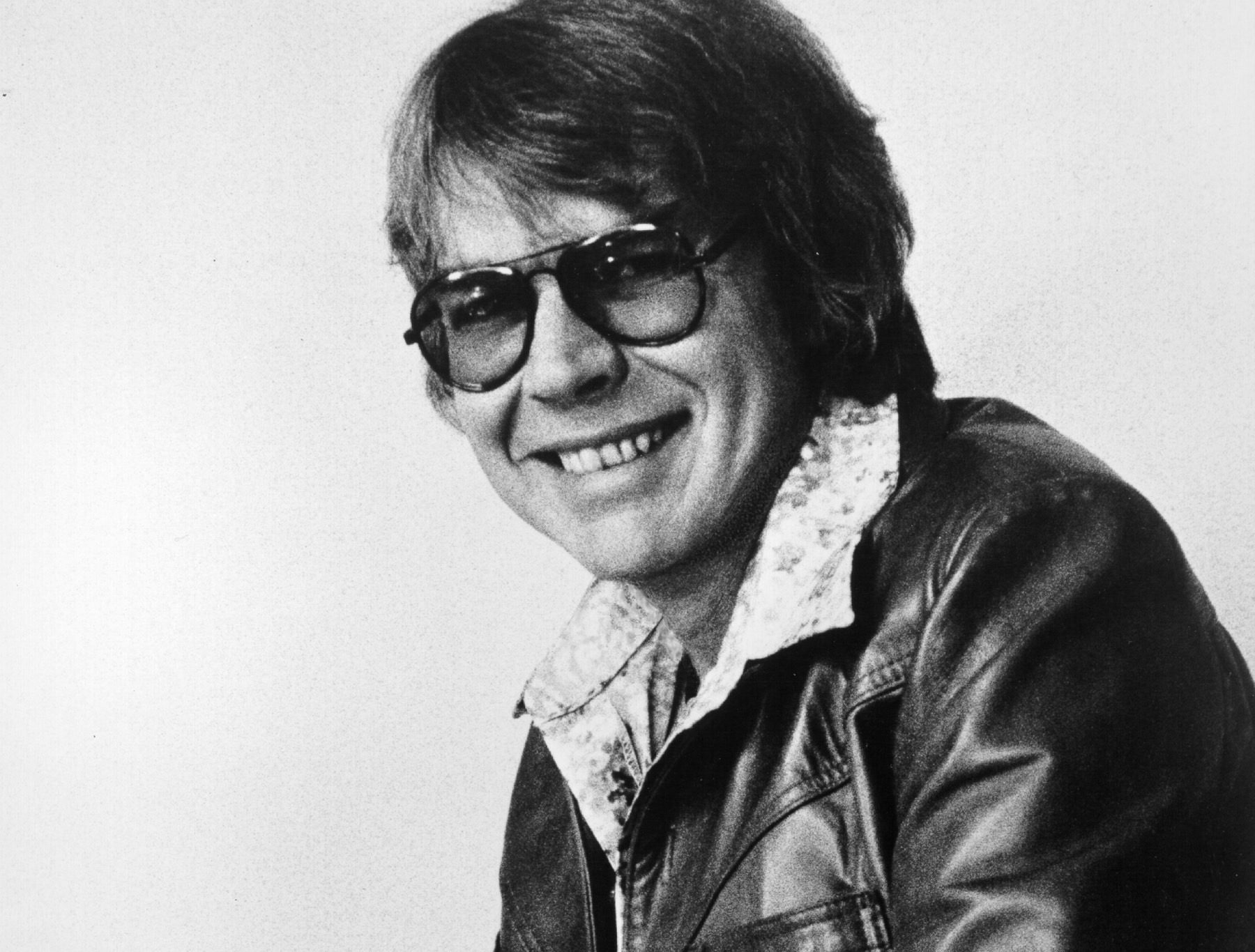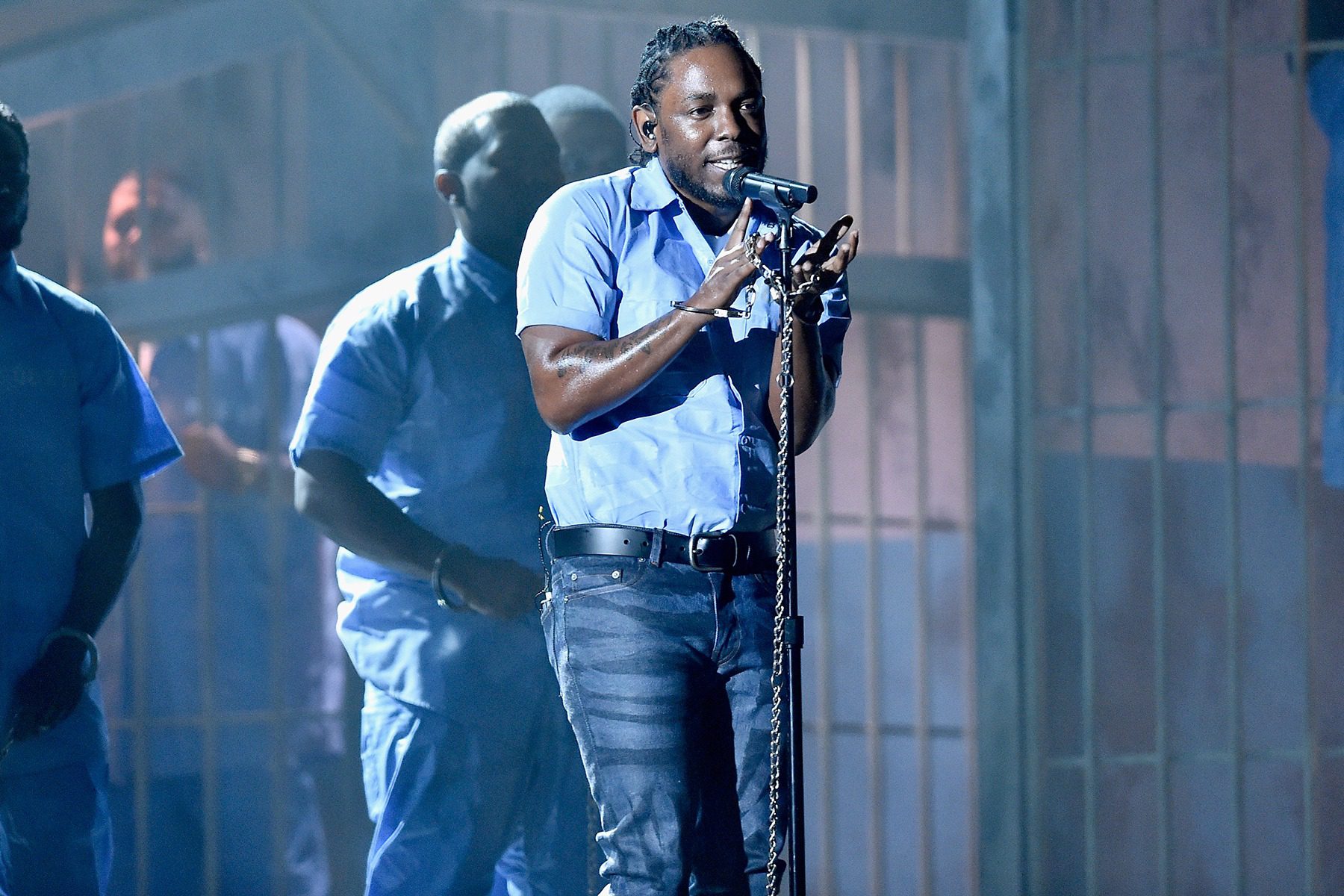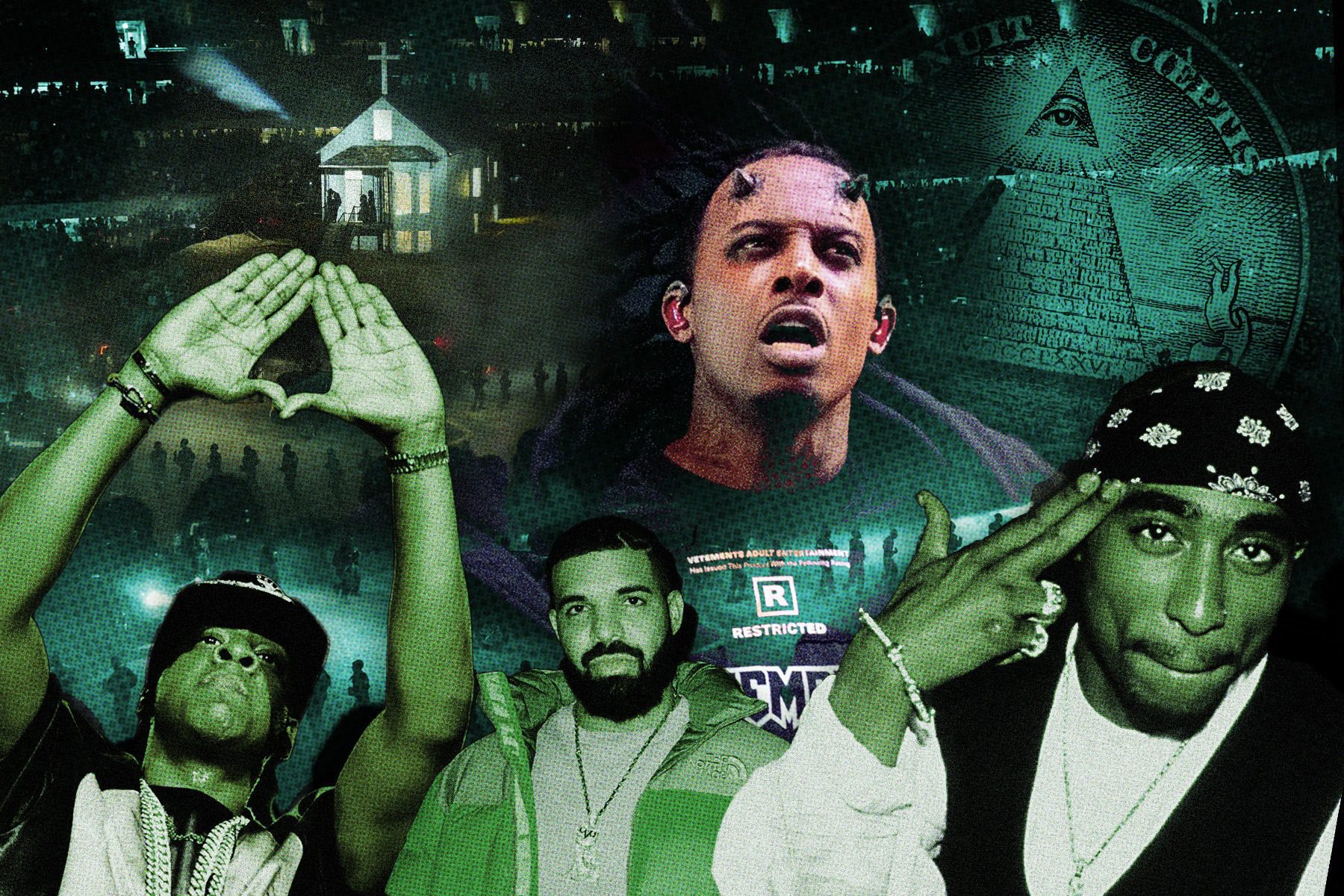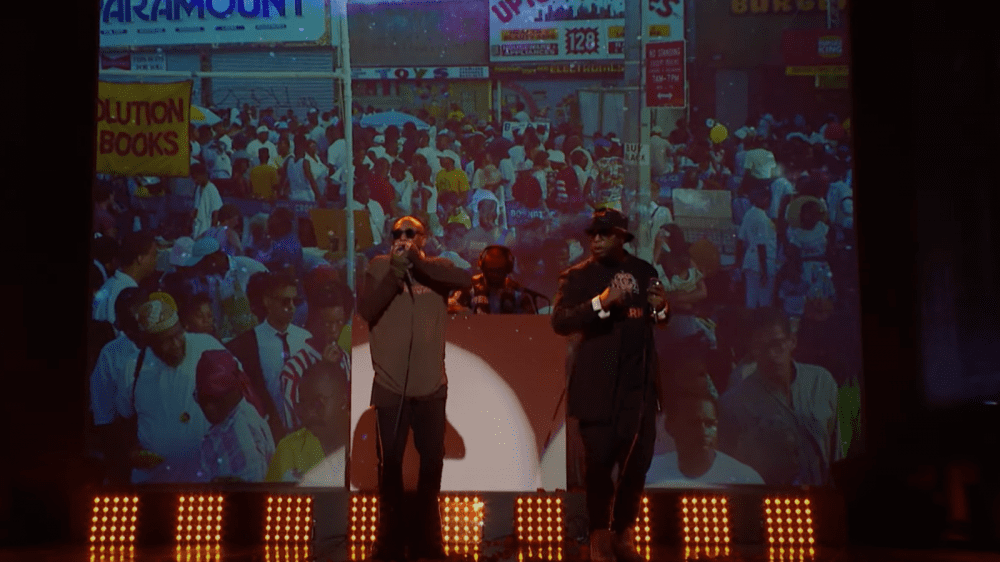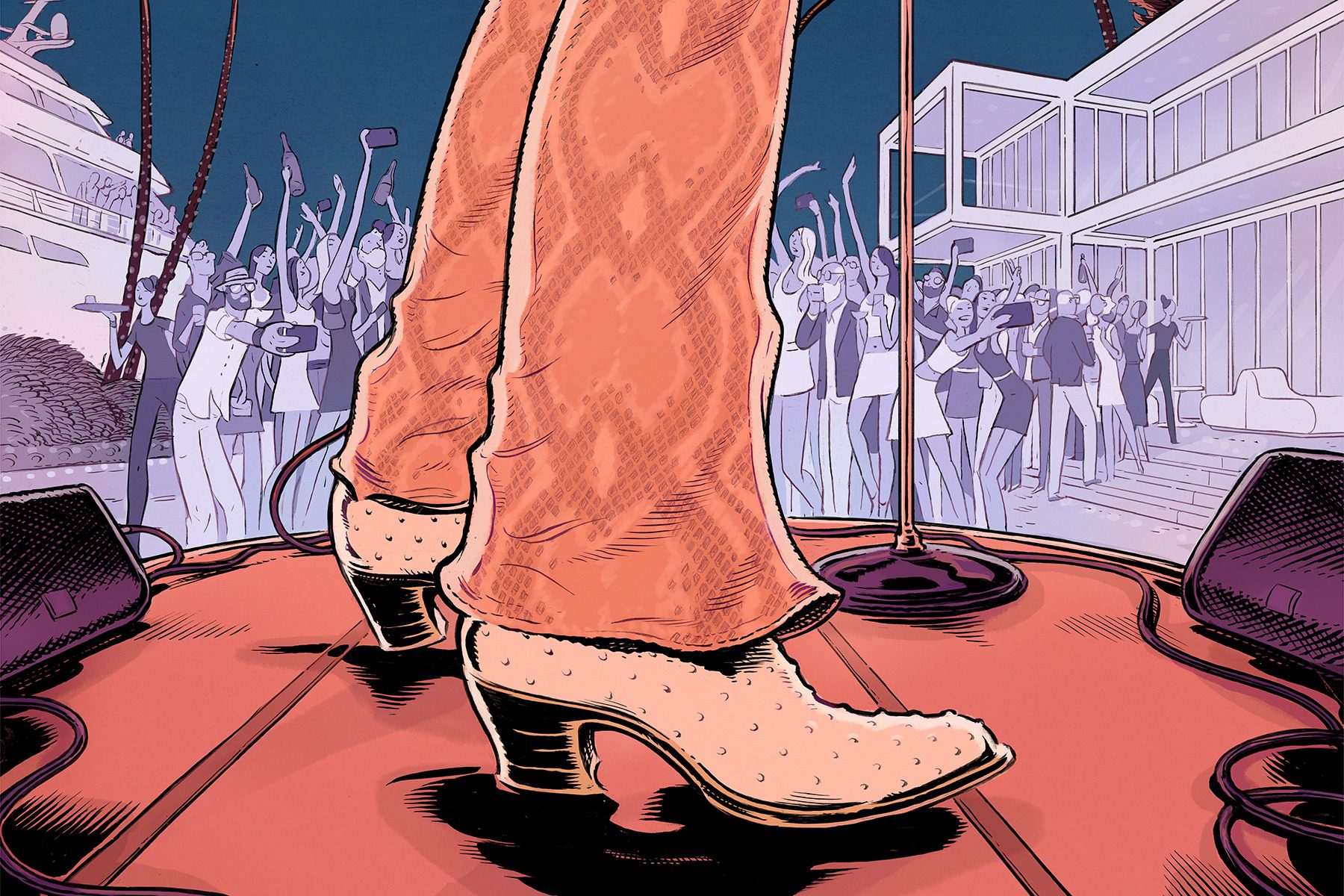
The Real Yacht Rock: Inside the Lavish, Top-Secret World of Private Gigs
For Jennifer Lopez, a November 2014 performance in Macau wasn’t entirely out of the ordinary. She’d have to sing (here, to a backing track) for 40 minutes, accompanied by six to eight dancers; the contract stipulated she’d be furnished with “first-class” sound and lights. No recording or taping of the performance would be allowed. But no tickets were sold, either. And the payday stood out, too: $1.25 million. To celebrate the birthday of a relative, a wealthy Chinese family flew Lopez to Asia to perform for them, tossing in $500,000 for airfare and hotel for her and her entourage. The opulence didn’t stop there; for the show, the family built a restaurant and a nightclub inside a Grand Hyatt ballroom, with a walkway connecting the two. And all for about 20 people in the audience, less than the number of crew members involved in working on the gig.
For more than 20 years, pop stars of all genres and generations, from Bob Dylan and the Eagles to Alicia Keys and John Legend, have been hired to play corporate events — big-paycheck performances for company employees or clients, often at theaters or arenas. Even during a pandemic, when live performances slowed down, that ecosystem has persisted. Last December, the blockchain-gaming platform Gala Games threw a “Galaverse” multinight private party in San Francisco, where its 500 guests gathered to hear Maroon 5, Alice Cooper, DJ Steve Aoki, a bit of Snoop Dogg, and a stripped-down set by two members of Arcade Fire. The venue included private rooms set up to look like a medieval tavern, a “Dungeons & Dragons” setup with a huge fake dragon, and a quasi Texas dance hall, while in another space, dancers were made up to look like zombies (to tie in with a Walking Dead game).
blogherads.adq.push(function () {
blogherads
.defineSlot( ‘medrec’, ‘gpt-dsk-tab-article-inbody1-uid0’ )
.setTargeting( ‘pos’, [“mid-article”,”mid”,”in-article1″,”mid-article1″] )
.setSubAdUnitPath(“music//article//inbody1”)
.addSize([[300,250],[620,350],[2,2],[3,3],[2,4],[4,2],[640,250]])
;
});
But alongside the world of corporate parties and retreats, a far more shadowy parallel world has been flourishing: the super-private gig. In that universe, stars in classic rock, hip-hop, and pop have been pulling in sizable fees for playing at weddings, birthday parties, anniversaries, and other personal-life milestones, all for those wealthy enough to afford it. The festivities allow performers to walk away with yacht-loads of cash and make one-percenter hosts feel like insiders and stars themselves. But along with the sizable paydays come sometimes dicey political issues that the artists have to navigate (or, sometimes, ignore).
In the early days of this industry, the only performers who would bite were oldies acts from the Fifties or Sixties. But today, the list of artists who’ve taken the money and played now reads like a pop chart. Fork over the right amount, as much as seven figures, and Beyoncé or Rod Stewart might play for your friends and family. The lineup includes veterans like John Mayer and newcomers like Charlie Puth (who was a surprise guest at a teenager’s bat mitzvah in Boston). Sugar Ray are available, as is the semi-supergroup Ezra Ray Hart, composed of Sugar Ray’s Mark McGrath, Tonic frontman Emerson Hart, and Better Than Ezra’s Kevin Griffin, who will rock your house with a slew of Nineties hits. Pitbull, Nicki Minaj, and Flo Rida have played bar or bat mitzvahs.
In a sign of generational changes, old-school hip-hop acts like Coolio, Too Short, Vanilla Ice, and Naughty by Nature have also been hired for such up-close-and-personal shows. “We’re seeing a lot of people who host a big-name artist in their mansions,” says Jay Siegan, whose company, Jay Siegan Presents, has helped book major acts like Coldplay and Celine Dion for corporate events. “They do it discreetly and for 30 to 50 friends, and they’ll have a million-dollar artist perform 45 minutes before they have a celebrity chef prepare a dinner. That’s the kind of thing we’ve seen more and more of.”
blogherads.adq.push(function () {
blogherads
.defineSlot( ‘medrec’, ‘gpt-dsk-tab-article-inbody2-uid1’ )
.setTargeting( ‘pos’, [“mid-article2″,”mid”,”in-article2″,”mid-article”] )
.setSubAdUnitPath(“music//article//inbody2”)
.addSize([[300,250],[300,251],[620,350],[2,4],[4,2],[3,3],[2,2]])
.setLazyLoadMultiplier(2)
;
});
Sugar Ray recently partook in a birthday party for a wealthy client in San Diego, who rented out a club for a few dozen of his friends. “You go out, you play for the 40 people, and they’re having drinks, having fun, going crazy,” says McGrath, who says he earns roughly half of his annual income from such events. “Some of those, you have to work really hard; you’re not getting the response you’re used to getting in your hard-ticket shows, and it might hurt your ego a little bit. That’s also a reason why you’re getting paid three or four times what you normally get paid.”
If none of this sounds familiar, there’s a reason. In an atmosphere where poverty and the unequal distribution of wealth are part of the national conversation, a new degree of secrecy has kicked in. Few artists are willing to discuss these jobs, and the people who book the parties often sign agreements not to disclose any details about the performers, host, or locale. Meanwhile, the artists themselves aren’t just cashing the checks but also grappling with who they play for and how much detail to reveal. “Some kind of opportunity was extended and we obliged,” says one pop star of a recent event where he played. “The thing about private parties is, if you’re not there, a lot of the details you don’t really want to discuss too much. That’s what allows it to maintain certain levels of exclusivity.”

Sugar Ray’s Mark McGrath, a mainstay of the circuit since the late Nineties, when the band got an offer to perform for a Bay Area tech company.
Scott Dudelson/Getty Images
Sugar Ray’s McGrath remembers the day he stumbled upon this new ecosystem. It was the late Nineties, the band’s “Fly” was dominating the radio, and they were offered a gig playing for a tech company in the Bay Area. “They had all these lasers and six different rooms, with a DJ in one room, and about 30 disinterested people milling about,” he recalls. “You’ve just kind of got to grind through it.” But he also remembers the payday — “seven times what we’d ever seen before” — and how the show left a mark. “We said, ‘This world is kind of fun,’ ” he says. “Back then, corporate parties or fairs were considered taboo — you were not cool if you did those things. We were never cool. So we didn’t have anything to worry about.”
blogherads.adq.push(function () {
blogherads
.defineSlot( ‘medrec’, ‘gpt-dsk-tab-inbodyX-uid2’ )
.setTargeting( ‘pos’, [“mid”,”mid-articleX”,”in-articleX”,”mid-article”] )
.setSubAdUnitPath(“music//article//inbodyX”)
.addSize([[300,250],[300,251],[3,3],[620,350],[2,2]])
.setLazyLoadMultiplier(2)
;
});
That era, roughly 25 years ago, marked the dawn of the corporate gig for classic rock, when six- or seven-figure fees would entice Stewart, Billy Joel, or Crosby, Stills, and Nash to play a show for company employees at corporate behemoths like Pepsi and Bank of America. In 1998, thanks to a reported just-under-a-million-dollars paycheck, Bob and Jakob Dylan co-headlined a show (for the technology-hardware manufacturer Applied Materials) for the first and only time.
The dot-com boom of the early 2000s took the private-party circuit to a new level. Jesus Jones’ Mike Edwards recalls the time his band, a decade after its heyday, was flown from the U.K. to the States to play a corporate conference — and all they had to do was play their lone hit, “Right Here, Right Now,” at the beginning of the event. “The host said, ‘Welcome, everyone, hope you have a good time, and here’s Jesus Jones,’ ” Edwards recalls. “We played 360 seconds, and the costs were minimal.. … There was always the subtle undertone of ‘You’re dancing with the devil,’ or somehow you’re a corporate whore. But we got to play a song of ours that we quite liked and come home with a load of money. You think, ‘Why wouldn’t you?’ ”
“Back then, corporate parties or fairs were considered taboo — you were not cool if you did those things. We were never cool. So we didn’t have anything to worry about.” —Sugar Ray’s Mark McGrath
The 2008 crash put the brakes on these fees, but according to talent bookers, as the economy began to improve over the past decade, those events picked up where they left off, and the super-private category — where the well-off are able to bring in a rock legend here, a pop icon there, to commemorate a special life moment — began to ramp up. Seal played aboard a yacht off the coast of Monaco for the members of a family who own a prominent airline. In 2018, Beyoncé was reportedly paid in the millions at the wedding of the children of two Indian billionaires. Around the same time, a one-percenter financier based in Utah constructed a full-on concert stage in his backyard to host Bad Company singer Paul Rodgers. The host spent more than $1 million to fly in chefs from the O2 arena in London, and turned his multicar garage into an industrial kitchen. Due to the altitude, EMTs supplied with oxygen tanks were also on hand.
The Rodgers event was organized by Element Lifestyle, a private firm that charges its high-end clients a $48,000 yearly membership to help them with travel and vacation arrangements — and, increasingly, music events. In one of those deals, Ricky Martin was paid $500,000 to take the 10-minute drive from his Los Angeles home to sing at a wedding. A client from Iran, a fledgling singer himself, had a lifelong dream to duet with Andrea Bocelli, and for around $1 million, the crooner was flown in from Italy to join the host onstage in Los Angeles. (Another client, by way of Siegan, paid for Bocelli to make a surprise visit to his company’s retreat in Italy.) “In the pre-Covid world, there were clients who love music and love the live-music experience but don’t necessarily love the thousands of people they’re surrounded by,” says Element Lifestyle founder Michael Albanese. “So this idea of creating an experience in their backyard or their home started to really take off.”
blogherads.adq.push(function () {
blogherads
.defineSlot( ‘medrec’, ‘gpt-dsk-tab-inbodyX-uid3’ )
.setTargeting( ‘pos’, [“mid”,”mid-articleX”,”in-articleX”,”mid-article”] )
.setSubAdUnitPath(“music//article//inbodyX”)
.addSize([[300,250],[300,251],[3,3],[620,350],[2,2]])
.setLazyLoadMultiplier(2)
;
});
According to Robert Norman, a CAA agent who helped pioneer this music ecosystem decades ago, another rich dude built “unique venues” for multiple party nights at his home. “We’re not talking about putting up a tent,” says Norman, who declines to mention the name of the host or the acts who played. “These were tiki lodges and a New Orleans–style blues house.”
Not everyone accepts the offers. According to a source, a one-percenter was willing to pay $250,000 to ride motorcycles with Bruce Springsteen or hire him for a private concert. Springsteen supposedly declined. U2 are requested regularly, but according to Siegan, “U2 is one where I just have to tell my clients no.” But those acts are increasingly in the music-world minority. “Some artists make their fees so high that people will say no to it,” says Albanese. “But everyone has a price at the end of the day.”
In 2018, during the prepandemic party gold rush, Bob McLynn of Crush Management, which handles Fall Out Boy, private-party regulars Train, and others, was taking his boat out for a spin off the Jersey shore when he came across dozens of boats parked in the water. Nearby was a carnival, complete with a Ferris wheel. “I yelled to one of the boats, ‘Who’s playing over there?’ ” McLynn says. “The guy says, ‘Who!’ I said, ‘Who’s playing over there?’ And he’s like, ‘The Who!’ ”
It was actually Roger Daltrey, performing with his own band in a tent for the New Jersey real-estate mogul Steve Silverman. “If you had told me they were playing a guy’s backyard over here, I’d be like, ‘No way — they’re in the Rock & Roll Hall of Fame,’ ” McLynn says. “ ‘What do they need to play a private gig for?’ But they’re all doing it.”
blogherads.adq.push(function () {
blogherads
.defineSlot( ‘medrec’, ‘gpt-dsk-tab-inbodyX-uid4’ )
.setTargeting( ‘pos’, [“mid”,”mid-articleX”,”in-articleX”,”mid-article”] )
.setSubAdUnitPath(“music//article//inbodyX”)
.addSize([[300,250],[300,251],[3,3],[620,350],[2,2]])
.setLazyLoadMultiplier(2)
;
});
When live music went into lockdown in March 2020, so did the private-gig world. But it didn’t completely shut down: During the height of the pandemic, artists including Sting, Leon Bridges, Keith Urban, Christina Aguilera, and Ryan Tedder of OneRepublic were hired for virtual private concerts, for fees starting at just under $100,000 and rising into the mid six figures.
But last year, as concerts began returning to some degree of normalcy, the way-under-the-radar bookings began to increase. This year, CAA alone has more than 700 events (both private and corporate) planned, each featuring one of its music acts. (Norman declines to specify which, but the company’s roster includes Lionel Richie, Bon Jovi, the Doobie Brothers, and Earth, Wind, and Fire.) According to two leading talent agencies, corporate-party gigs once accounted for the bulk of such exclusive shows, about 75 percent, but private ones are inching up from 25 to 40 percent of that combined income. “There are so many great opportunities out there, and more to come,” says manager Michael Lippman, one of whose acts, Matchbox Twenty, has hit the private-party circuit. “It’s much bigger now than it was then.” Sometimes, the party hosts initiate the discussions, reaching out to talent agencies — and finding the right match of music, audience, and remuneration.

Private-gig regular Lenny Kravitz at a Florida party that also featured lots of champagne and a set by T.I.
Alexander Tamargo/Getty Images
Even as Omicron was starting to hit last fall, the music and the festivities didn’t completely stop. In December, Lenny Kravitz and the controversial rapper T.I. were hired for undisclosed fees to play at a waterfront property in Miami owned by flush art collector and coal-family scion Wayne Boich. The occasion was Richard Mille After Dark, celebrating the high-end Swiss watchmaker. To a crowd that included Venus and Serena Williams, Leonardo DiCaprio, and Wolf of Wall Street inspiration Jordan Belfort, Kravitz emerged to play a set, followed at midnight by T.I. — as a yacht pulled up alongside to watch them.
Thanks to confidentiality agreements, the fees collected by the artists can be hard to pin down: They can range from five-figure deals to what one booker calls “six- or seven-figure situations” for pop icons. “I am constantly coaching my clients through their sticker shock,” says Siegan, citing a seven-figure price tag from Bruno Mars; another source says Mars can command as much as $4 million.
blogherads.adq.push(function () {
blogherads
.defineSlot( ‘medrec’, ‘gpt-dsk-tab-inbodyX-uid5’ )
.setTargeting( ‘pos’, [“mid”,”mid-articleX”,”in-articleX”,”mid-article”] )
.setSubAdUnitPath(“music//article//inbodyX”)
.addSize([[300,250],[300,251],[3,3],[620,350],[2,2]])
.setLazyLoadMultiplier(2)
;
});
“Probably bands that were a little hesitant to do them are more willing to now,” says McGrath. “[The hosts] usually have their own Covid protocol, and there are less people involved. You’re not carrying your crew, you’re not carrying buses, so it’s high reward, less risk. And so what’s not to love about that? A lot of them are destination events in Cabo, the Bahamas, Hawaii. It’s like, ‘Yeah, twist my arm.’ ”
For some musicians, the appeal isn’t always financial. “The private events will try to cater to the artist more than the average promoter,” says Kevin Monty of Red Light Management, which manages Phish, the Dave Matthews Band, Valerie June, and many others. “Give them nicer wine or access to lodging that might be exclusive, and the catering is better than a club gig.” Artists can make their own demands — like, in rare instances, no dancing during their sets. “It’s a great way to network and exchange ideas with people who may be like-minded, but not in the same professional arena as you,” says one artist who’s played a private show.
Whether they want to entertain the thought or not, pop acts are newly reconsidering super-private shows thanks to Covid: They may want to compensate for lost touring revenue, help support their crew, keep up their chops, augment their low streaming income, or all of the above. “There are probably some artists out there who will try to make up for lost time and be a bit more active than they might have otherwise been,” says Red Light’s Monty. “People have a sense of obligation to their band and crew to give them the opportunity to work. That was largely taken away, but now is the chance.” Adds Siegan, “It’s such a significant revenue stream for bands who are in demand. I’m frankly amazed by artists who shy away from this, particularly in this new music economy, where there’s less revenue from record sales.”
“There was the undertone of ‘You’re dancing with the devil,’ or you’re a corporate whore. But we got to play a song of ours that we quite liked and come home with a load of money.”
—Jesus Jones’ Mike Edwards
But with the uptick in such gigs and the outsize paychecks has come a new code of silence. Increasingly, musicians and party planners have to sign nondisclosure agreements. Through their representatives, many of these artists declined to discuss the events or fees with IndieLand or did not respond to requests to do so; the same with some of the higher-profile hosts.
blogherads.adq.push(function () {
blogherads
.defineSlot( ‘medrec’, ‘gpt-dsk-tab-inbodyX-uid6’ )
.setTargeting( ‘pos’, [“mid”,”mid-articleX”,”in-articleX”,”mid-article”] )
.setSubAdUnitPath(“music//article//inbodyX”)
.addSize([[300,250],[300,251],[3,3],[620,350],[2,2]])
.setLazyLoadMultiplier(2)
;
});
In some cases, guests have had to hand over their cellphones to avoid photos leaking on social media. “It’s super-confidential,” says agent Greg Janese of UTA, which also books many of its clients for private events, like Pitbull, Flo Rida, and other contemporary acts. “We get a lot of offers for upper-high-end private parties, where you get to sign a nondisclosure. People just don’t want it out that they’re booking these kinds of parties.”
In the U.K., the catering company Global Infusion Group (and its offshoot Eat to the Beat) has provided food for many such events. Among the most recent was a wedding at a castle with a major pop act — and that’s all CEO Bonnie May can say about it. “For some certain clients that love the confidentiality, it’s a great attraction in terms of working for us, and we are really, really strict,” May says. “There is just a no-go area in terms of sharing that on social media.”
Given the way that those in the field predict business will go in the next few years, it’s unlikely that such a veil of secrecy will be lifted anytime soon. “When things started to return to ‘normal,’ whatever the hell that is, it still wasn’t considered prudent to be throwing lavish parties,” Siegan says. “That said, there is an air of excitement with many of our clients around throwing parties, impressing their friends and colleagues, and just going over the top again. It feels like an impending Roaring Twenties.”

Jennifer Lopez at her controversial 2013 performance in Turkmenistan in Central Asia, for which her camp later apologized.
Igor Sasin/AFP/Getty Images
In 2005, David H. Brooks, whose company built bulletproof vests for the military, hired Stevie Nicks, Steven Tyler and Joe Perry, Tom Petty, the Eagles, 50 Cent, Nelly, and others for a bat mitzvah for his teenage daughter, paying some of them in the low millions. Two years later, he was arrested for (among other allegations) insider trading and using company money to pay for his lavish lifestyle; he was serving 17 years in prison before his death in 2016. “This guy ended up being a crook, and it was a nightmare,” says Janese, who was working at the time with Tyler and Nicks. “It was just a bummer that that happened.”
Organizing private-bash events can be a headache on any number of levels, which sometimes includes transforming someone’s house into a concert space. “You need an experienced production manager,” says manager Jonathan Wolfson, whose clients, such as Hall and Oates, have played private parties (including one at a Long Island estate, where Hall and Oates were joined onstage by Jamie Foxx). “There are safety issues. Sometimes stages have to be built, and not everyone’s backyard is set up for an event.” In 2016, Sia was offered $1 million for a backyard event in St. Barts, for which the host was prepared to build a dance floor and canopy with a clear roof. But in the end, Sia pulled out when her camp realized that the small outdoor space couldn’t accommodate her full, normal production and dancers.
Vetting the people putting up the money is even more complicated. Given that the $10 million Brooks used for his daughter’s party was cited by the Justice Department as one of his financial misuses, the incident reveals the potential red flags involved in such paydays. In 2013, Lopez sang “Happy Birthday” to the president of Turkmenistan, the Central Asia nation just north of Iran. There, according to the Human Rights Watch report that year, “human rights defenders and other activists face the constant threat of government reprisal. The government continues to use imprisonment as a tool for political retaliation.” (The report also cited President Gurbanguly Berdimuhamedow’s “cult of personality.”) After receiving backlash for the show, which was held at a lavish resort in the country, Lopez’s camp issued a statement that “had there been knowledge of human rights issues of any kind, Jennifer would not have attended.”
blogherads.adq.push(function () {
blogherads
.defineSlot( ‘medrec’, ‘gpt-dsk-tab-inbodyX-uid7’ )
.setTargeting( ‘pos’, [“mid”,”mid-articleX”,”in-articleX”,”mid-article”] )
.setSubAdUnitPath(“music//article//inbodyX”)
.addSize([[300,250],[300,251],[3,3],[620,350],[2,2]])
.setLazyLoadMultiplier(2)
;
});
According to a source, Billie Eilish was offered seven figures for a Middle Eastern gig and passed. Train turned down a big-payday show in that part of the world as well. “It was a guy who made money in the diamond business,” says McLynn, “and we didn’t feel comfortable doing it.”
“Some artists are more selective and want to know all about who they’re performing for, more so for the private events,” says Adam Grayson of the talent booking agency GrayRock Entertainment, which helps arrange for musical acts to play for clients. “They’re not going to just blindly go into something, and often they do want to know the politics. Some don’t care, some do.”
In the meantime, the circuit isn’t going anywhere, and neither are the paychecks. Matchbox Twenty and Sugar Ray this year are each booked for weddings in the Bahamas and Canada, respectively. McGrath does specify that playing a wedding doesn’t mean he’ll be introducing the couple or playing a first-dance song. “They’ll have a big hall or a club, and we’ll play,” he says. “It’s not Adam Sandler in The Wedding Singer. But I’m not saying that’s not going to be my future.”
